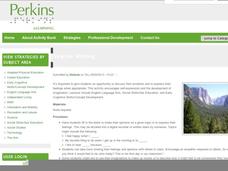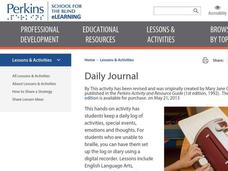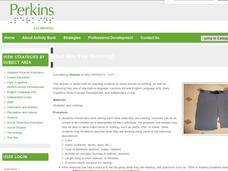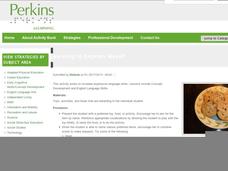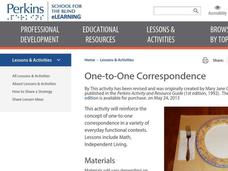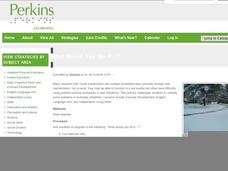Perkins School for the Blind
Encouraging Students Who are Blind or Visually Impaired to Express Their Feelings and Explore Imagination
Being expressive in a creative, empathetic, or imaginative way is not only fun, it builds good pre-writing and communication skills. Learners with visual impairments have a roundtable discussion session where several sentence frames...
Perkins School for the Blind
Daily Journal
Keeping a daily journal is fun. It builds strong writing skills and provides an expressive outlet. For children with visual impairments, it's even more important. It provides a way for them to connect written word with real events,...
Perkins School for the Blind
Learning Names of Articles of Clothing
What to wear today; such a vexing question. Spend some time introducing the names, fabrics, types, colors, and functions of various articles of clothing to your class. Each child will take turns asking each other what they are wearing....
Perkins School for the Blind
Learning to Express Myself
Expressing one's wants and needs is vital for learners of any age or ability level. Young children with visual impairments and intellectual disabilities practice asking for preferred items, foods, or activities in a structured manner....
Perkins School for the Blind
Let's Pretend
Playing pretend with real objects or concepts is a wonderful way for learners to make object-to-action connections, as well as practice daily living skills. Learners with visual and intellectual disabilities use a wide variety of real...
Perkins School for the Blind
Kitchen Clean-up
If you make a meal, you must clean up the mess. Foster a sense of independence while having learners practice a skill they can use in the workplace. Teens with visual impairments practice cleaning, organizing, stacking, and sorting a...
Perkins School for the Blind
Coin Identification
You got some money, and you're not afraid to use it. Before you can use that money, you need to know what it's worth. Included is a set of activity instructions that will help your visually impaired learners indentify coins. Pupils...
Perkins School for the Blind
Planning a Special Event
I love planning parties, they are a great way to get social, require organizational skills, and engage cooperative problem solving. Teens with visual impairments put their heads together to plan an event for their friends. They...
Perkins School for the Blind
Eating Out
Going out to lunch, reading a menu, making choices, and spending time socializing are all parts of growing up. Teens with visual impairments use several braille menus from local restaurants to practice ordering and appropriatelyeating...
Perkins School for the Blind
One-to-One Correspondence
Here is an interesting way to build concept understanding regarding one-to-one correspondence. Learners with visual impairments will use an array of everyday objects in context to foster an understanding of what one-to-one correspondence...
Perkins School for the Blind
Balance Stations
Children with visual impairments need to continuously work on balance, gross motor skills, and mobility. Foster mobility and orientation skills by engaging them in a series of fun balance stations during PE. You'll set up each...
Perkins School for the Blind
Building a Basic Series Circuit
Make science a fully accessible subject for your learners with visual impairments. They'll use tactile models to explore the nature of basic electrical circuits. Template board, wires, batteries, and Velcro are used to construct the...
Perkins School for the Blind
Conductors of Heat - Hot Spoons
Why is the end of a spoon hot when it's not all the way in the hot water? A great question deserves a great answer, and learners with visual impairments will use their auditory and tactile senses to get that answer. A talking...
Perkins School for the Blind
The Mystery Box - Making Observations and Collecting Data
Making observations and collecting qualitative and quantitative data is a vital skill all scientists need to practice. Help your scientists with partial and no sight learn how to use their other senses to make observations for...
Perkins School for the Blind
Modified Golf
Golf is a popular game that is enjoyed around the world. Invite your pupils with visual impairments or blindness to putt a few balls or make a hole in one. This lesson provides several very good suggestions as to how you can teach an...
Perkins School for the Blind
Modified Kickball
Kickball is a classic recess game that everybody should play at least once. Included here is a wonderful set of instructions that describe how you can modify the game to make it accessible to children with low or no visual ability....
Perkins School for the Blind
Capture the Treasure
Did you ever play capture the flag? I did, and it was so much fun! Your learners with special needs, physical handicaps, or visual impairments can play a classic and highly engaging game with a few minor adaptations. The best part is,...
Perkins School for the Blind
Figure Eight Walking
Walking in a straight line is one thing. Walking while trying to shift your weight from side to side to maintain balance is another challenge altogether. Learners with visual impairments practice walking in a figure eight. Cones are set...
Perkins School for the Blind
Modified Disc Golf
Here is a great set of adaptations and modifications that will make your next game of disc golf accessible to all your pupils. Listed are several variations and ways you can modify the game for your learners with physical or visual...
Perkins School for the Blind
Cooking and Kitchen Tools
Independent living skills and skills that can be used to gain employment are very important for any learner. Teens with visual impairments explore the kitchen to understand what everything is and what it all does. The lesson includes a...
Perkins School for the Blind
Human Body Regulation
The human body can regulate itself through sweating and resting. Learners with visual impairments discuss how the body changes when it is under stress and what it does to regulate itself. To start, kids use talking thermometers to take...
Perkins School for the Blind
What Would You Do If...?
What would you do if...? That's a great question, and, when posed to learners with visual impairments, a question that can foster concept development and speaking and problem-solving skills that relate to real-life situations. The...
Perkins School for the Blind
Letter Confusion
Teaching a child with low or no vision how to read is the same as teaching a sighted child how to read — it all starts with letter recognition. This is a simple way to provide your learners with an opportunity to practice reading and...
Perkins School for the Blind
Student Store
Vocational training activities are extremely important for learners with intellectual or physical disabilities. Here is a great idea that will help your class become skilled at money handling, basic economic concepts, interpersonal...


